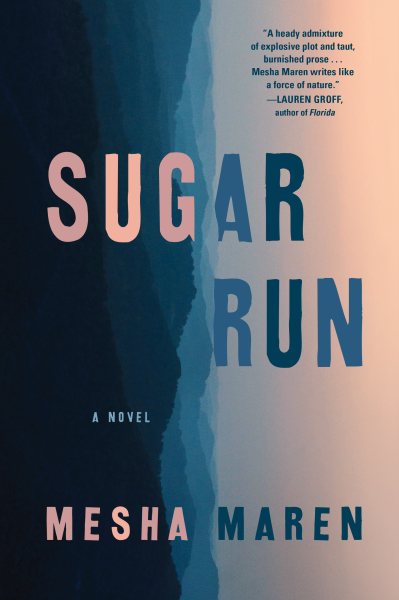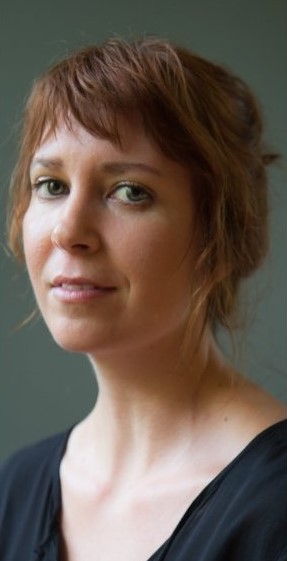Interview by Jana Hoops. Special to the Clarion-Ledger Sunday print edition (January 6)
West Virginia native and resident Mesha Maren explores the questions and the difficulties of coming home again–and the fear of not fitting in anymore despite the strong pull of the land itself–in her debut novel, Sugar Run (Algonquin Books).
 The novel tracks the stories of main character Jodi’s life through two time frames–as a 17-year-old in 1988-1989, when she landed in a Georgia prison for killing her girlfriend; and the “present” year of 2007, which finds Jodi, now 35, being newly released from prison and eager to get on with her life. It soon becomes complicated, though, by acquaintances old and new who have their own problems to settle.
The novel tracks the stories of main character Jodi’s life through two time frames–as a 17-year-old in 1988-1989, when she landed in a Georgia prison for killing her girlfriend; and the “present” year of 2007, which finds Jodi, now 35, being newly released from prison and eager to get on with her life. It soon becomes complicated, though, by acquaintances old and new who have their own problems to settle.
Maren is the recipient of several writing fellowships and grants, including the 2014 Jean Ritchie Fellowship in Appalachian Writing and the 2015 Thomas Wolfe Fiction Prize. She is the 2018-2019 Kenan Visiting Writer at the University of North Carolina at Chapel Hill and is a National Endowment of the Arts Writing Fellow at the Beckley Federal Correctional Institution in West Virginia.
Her short stories and essays have appeared in Tin House, the Oxford American, Hobart, Forty Stories: New Writing from Harper Perennial and other publications.
You’ve said that you started writing seriously in 2007 when you realized you “had stories to tell.” Tell me about the kinds of stories you believed should be told.
I don’t believe that there are any particular stories that “should” be told, like in a social novel kind of way, I think that I just come from a community and a family that trained me to have a good ear for great stories and to enjoy telling them.

Mesha Maren
When I was growing up, I was always hearing stories from my neighbors and my dad. My dad is not from West Virginia. He moved to Greenbrier County in 1979, but he has a huge respect for the people who came before him in this place and he always impressed upon me how important it was to know the story of the place, the people who walked across this field and over the cliff to work in the quarry and then back home again with 50-pound sacks of chicken feed on their shoulders, men who were killed young and mostly outlived by strong women who kept their stories going. These stories don’t very often make it out into the world, though–they are not represented very well in mass consumed books.
There is a thing that happens in all forms of art, I guess, but it particularly happens in writing about Appalachia, where the stories get diluted to please the lowest common denominator. It’s like adding corn syrup to food–you sweeten it up and smooth it out so that it appeals to the masses and you end up with something sweet and quaint with all the fangs taken out, a little bit like how the minstrel shows worked in the early 19th century: you show people what you think they want to see, to entertain them and show them that you are harmless and funny.
I guess that even though I don’t believe that there are any particular stories that “should” be told more than other stories, I do believe there is a way to tell a story that is real and right. I’ve never wanted to write something that people could passively consume–I want you to feel uncomfortable.
You have said that Jodi, around which Sugar Run revolves, “took up residence” in your head. Tell me about that.
I started to become infatuated with Jodi McCarty in about 2010. And it was really that, an infatuation, like I would daydream about her all the time and when I tried to put her down I just couldn’t. In writing Sugar Run, I was really teaching myself how to write. It was the first big writing project I ever undertook, and it was hard, and I doubted myself a lot. I doubted if I could really write a novel, much less this novel, but Jodi wouldn’t let me alone. There were multiple times when I wanted to give up on Sugar Run and I’d say, ‘I’m done’ and throw the pages in a drawer, but Jodi haunted me–it felt like I had slighted a friend or partner.
Finally, I made a pact with Jodi, I told her I would do my damnedest to write a good novel, find an agent and a publisher, but if I tried my best and nothing came of it, no one picked up the novel, then I’d get to be free and work on writing something else.
Your childhood experiences of your father taking you with him at an early age to counsel incarcerated women in your home state of West Virginia obviously influenced much of the plot around which Sugar Run is based. Tell me about those visits, and the impression they made on you.
My dad worked for a nonprofit and he would go in to the prison in Alderson to see the women who had not been visited by friends or family for over a year. I would often come along with him. As a kid, I was most impressed by the fact that I got to eat whatever kind of candy I wanted from the vending machines, but yeah, I think seeing those women, hearing them talk about their lives, it left an impression on me that was part of what maybe inspired Sugar Run, although I never really thought about that until after I’d written the novel.
All of the main characters in Sugar Run are facing their own kinds of struggles, including poverty, violence, pervasive fear, substance abuse and other addictions. The fact that they are all headed to West Virginia, a state with its own difficulties, compounds the suffering. Was it was hard for you to find spots of redemption for these characters in the end?
I honestly think that everyone, everywhere, not just in West Virginia, is probably closer to the edge than we ever let ourselves believe, closer to making a few “bad” decisions and seeing everything fall apart around us. The thing is that a lot of folks have a stronger safety net and, really, that comes down to money. If you come from a family with more money and you slip up, it’s easier to get back on track but if you live in a rural place and have few resources the fall is much more steep. Trying to find work after prison is really…hard for anybody, but of course, it is even harder when you live in a rural place.
In a lot of ways West Virginia has always been and will always be both the balm and the sting–it is not an easy place to live and never has been, both because of the economy but also just the natural geography, but that is also what makes it one of the most beautiful places in the world and it brings folks closer together. I’ve never known community like the communities in West Virginia, the way that people band together to care for each other–it doesn’t happen like that in other places.
The book actually tracks two alternating story lines of Jodi’s life, interdependent on each other. Tell me about your decision to tell these plots using this technique.
These two parts of the story, 1988-89 and 2007, came to me in very different colors and textures–like they were always distinctly different but of course part of the same story. I think that’s why I ended up writing the 1988-89 sections in present tense because I needed them to feel different and in a certain way almost more immediate and tangible to Jodi than her present 2007 reality–they’re like a picture show she has watched a million times during her years in Jaxton prison.
Sugar Run is your first novel. Did it surprise you that your manuscript was sold on the first round of publisher bids? Tell me about that experience.
Yeah, it did kind of surprise me–I mean Sugar Run is essentially a novel about a convict lesbian living on a mountain in West Virginia–not the kind of story you think of having huge mass appeal, and I think that a lot of New York publishers didn’t know what to do with it. There wasn’t a neat little box they could fit it in, they weren’t at all sure how they would market it.
So, Algonquin is the perfect home, you know, it just makes complete and total sense that Sugar Run is being published by a publishing house that started out being housed in a woodshed in Chapel Hill, North Carolina. Algonquin began the year before I was born in Louis Rubin’s woodshed and one of the first people they published was Larry Brown, a firefighter who started writing fiction in his spare time. So yeah, Algonquin feels like the perfect home for me and Sugar Run.
What’s next? Do you have another book idea in the works yet?
Yes, I just finished a second draft of my new novel, Perpetual West. This new novel is about Mexican professional wrestling. The story follows Alex, a sociology student who was born in Mexico, but adopted and raised by a white couple in West Virginia, and his wife Elana, who move to the U.S.-Mexico border where Alex is writing his thesis on lucha libre.
It’s been a real fun novel to write and I got to go do research in Juárez and Mexico City, and I took wrestling lessons, too. I was terrible at it though, so I guess I’ll stick with writing.
Mesha Maren will be at Lemuria on Tuesday, January 15, at 5:00 p.m. to sign and read from Sugar Run.


Comments are closed.